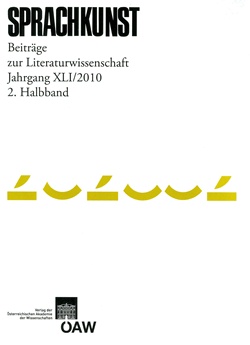
Sprachkunst Jahrgang XLI/2010/2. Halbband, pp. 245-262, 2012/07/18
Beiträge zur Literaturwissenschaft

This article analyses the metaphors of height and mountains in the prose work of Thomas Bernhard, interlinking them with his concept of writing. It argues that the vertical axis is marked by a historical index, which succinctly articulates the dilemma of the post-war writer, who is entangled in a genealogical and dynastic relationship with a generation of perpetrators. In Bernhard’s prose, the notion of height as material and cultural heritage is occupied by a “deadly parental inheritance” (›Beton‹) that renders the rhetoric of overcoming and sublimation futile. This essay thus examines the sociohistorical and poetological motivation of Bernhard’s critique of height, resulting in a deconstructivist form of writing.